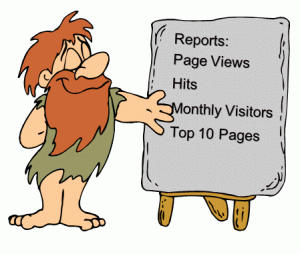Expecting Different Results From Doing the Same Thing
Velleity is a word that has dropped out of the general vocabulary, unfortunately. I am attempting to bring it back, as it has more relevance now than ever.
Velleity is a desire to see something done, but not enough desire to take action that will make it happen. Wow!
Reporting v Analyzing
In my analytics training classes I ask the attendees about their analytics reporting routine. Sometimes I make fun of the in-house analyst that has to report numbers like unique visitors, hits and sessions. Then, they spend the rest of the month justifying why that number was higher or lower than the prior month. Unfortunately, as I make that statement I see too many heads nodding in agreement. I feel for those people who are locked in a never ending cycle of velleity. 
These are what I call “Caveman Analytics.”
Unfortunately, too many businesses are trapped into thinking that big numbers are impressive. Big numbers = big business, right? But what do you do with those numbers? How does that affect your strategy?
Questioning the Strategy
As soon as someone starts asking questions, the house of straw blows away. Simply reporting numbers is not an analytics strategy, and it certainly will not lead to any amount of website improvement. And yes, I do know of some companies that include “Hits” in their monthly reporting.
(If that is you, reporting hits, stop. Hits are not a count of any relevance for your marketing. It’s just a big number.)
Questioning As a Strategy
Questions are the foundation for our learning. They expose motivations and require explanations. Many corporations and businesses are famous for encouraging the heads-down, lock-step agreement survival tactics. Asking questions is not popular, nor is it encouraged. Asking questions is perceived as rebellion, rather than progress. In the 60’s the radicals told us to question authority. Now that they are in authority, the last thing they want is to be questioned.
Neil Postman speaks about the importance of questioning, saying “question-asking is the most significant tool human beings have.” Even more important that software, servers and summaries, questions are an analysts’ primary tool. Postman even suggested that the reason why we don’t teach the ability to question in schools, is because eventually the students will question the teacher. Questions are subversive, but they result in people finding answers.
Questions – The Cure for Velleity
Velleity is what keeps companies locked in this mindset of reporting useless numbers. Desiring, even expecting to someday have an epiphany of change, but not willing to change the mindset or the culture of locked-in reporting to achieve it. Nor are they willing to ask the hard questions in order to uncover what must be done.
Related Articles:
No Goals = No Analytics!
Marketing Without Metrics
The Lost Art of Sales
